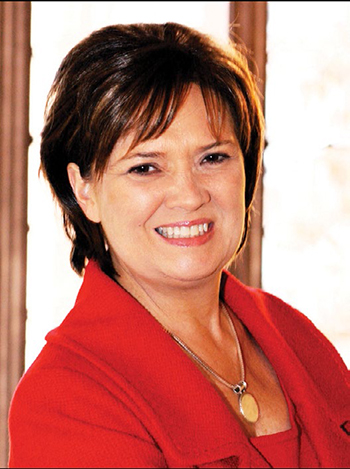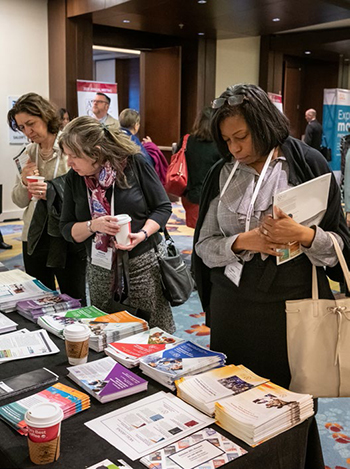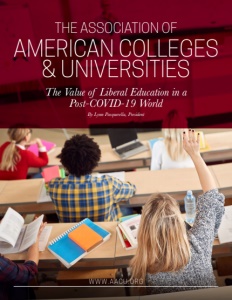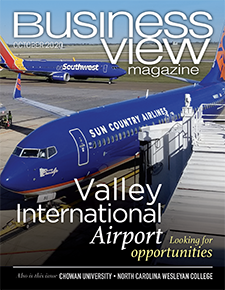The Association of American Colleges & Universities
The Value of Liberal Education in a Post-COVID-19 World
By Lynn Pasquerella, President

President, Lynn Pasquerella
In 1915, amidst the changing landscape of American higher education, 150 college leaders gathered in Chicago to form the Association of American Colleges. Founded on the values of inclusiveness and interconnectedness, the Association served as a forum for championing the primacy of liberal education at a time when it was considered under threat due to the rise of public universities. Dedicated to “learning the truth about the colleges, telling the truth about the colleges, making better colleges,” AAC served as a compelling voice and force for quality liberal education.
From its inception, AAC welcomed as members both liberal arts colleges and colleges of arts and sciences within public universities. However, in 1995, the Association took the critical step of changing its name to the Association of American Colleges and Universities to reflect an increasingly diverse institutional membership. The transition from AAC to AAC&U coincided with a growing emphasis on issues of equity and quality in higher education, and, in support of these values, the Board of Directors outlined five priorities to guide the work of the Association:
- mobilizing collaborative leadership for educational and institutional effectiveness;
- building faculty leadership in the context of institutional renewal
- strengthening curricula to serve student and societal needs
- establishing diversity as an educational and civic priority;
- fostering global engagement in a diverse but connected world.
Over the next decade, AAC&U foregrounded its commitment to equity and inclusion, culminating in the expansion of the Association’s mission in 2012 to embrace inclusive excellence as central to liberal education. The goal was to signal a commitment to the ideal that access to educational excellence for all students — not just the privileged—is essential not only for a thriving economy but, more importantly, for democracy.
Today, AAC&U represents more than 1,200 accredited colleges and universities, comprising large and small, public and private, two-year and four-year, domestic and international, secular and faith-based institutions; tribal colleges, Hispanic-Serving Institutions, Historically Black Colleges and Universities; and entire state systems. The mission of the Association is to advance the vitality and public standing of liberal education by making equity and quality the foundations for excellence in undergraduate education in service to democracy.
The initiatives emerging from AAC&U’s mission, vision, and values are led by a diverse staff of 55 individuals. The program offices, which include Undergraduate STEM Education; Diversity, Equity, and Student Success; Quality, Curriculum, and Assessment; and Global Citizenship for Campus, Community, and Careers, are bound together by a shared commitment to faculty-engaged, evidence-based, sustainable models and strategies for promoting quality in undergraduate education; advancing equity across higher education in service to academic excellence and social justice; leading institutions and communities in articulating and demonstrating the value of liberal education for work, life, global citizenship, and democracy; and catalyzing reform in higher education to emphasize discovery and innovation as fundamental aspects of a liberal education.
The process of furthering these strategic goals is grounded in efforts spanning three cross-cutting areas. The first is evidence building aimed at the development of best practices within the higher education community, promoting faculty-led assessment of student learning, and demonstrating the value of AAC&U’s work. The second entails expanding capacity by enhancing faculty and leadership development, identifying and bringing effective practices to scale, and implementing educational reforms that fulfill the individual and collective objectives of AAC&U’s members. The third area involves accelerating advocacy and outreach by providing tools and resources that help faculty, academic and student affairs leaders, provosts, and presidents promote AAC&U’s mission and communicate effectively regarding the value of an equitable, high-quality liberal education.
AAC&U is at the forefront of efforts to identify, frame, and address key issues in the academy, serving as the leading resource for expertise, best practices, strategies, and models that foster liberal learning, quality, and equity in higher education. Through its programs, publications, events, and public advocacy, AAC&U reinforces a commitment to liberal education at the national, local, and global levels and helps colleges and universities ensure that the quality of student learning is central to their work as they evolve to meet new economic and social challenges.
 Last April, at a time of unparalleled transformation in the academy, AAC&U released a new vision for future of liberal education entitled “What Liberal Education Looks Like.” It is a vision that details the ongoing dynamism and enduring relevance of liberal education as essential for positioning students for success in a world none of us can fully predict. When this vision was first unveiled last January at AAC&U’s 2020 annual meeting in Washington, DC, no one could have anticipated that the world as we knew it would be upended. In response to the monumental financial challenges precipitated by a global pandemic, colleges and universities across the country have implemented tactics that include faculty and staff furloughs, travel bans, and hiring freezes. Increasingly, these measures are accompanied by the excising of arts and humanities in favor of vocational and pre-professional programs, seen as more marketable to prospective students and their parents.
Last April, at a time of unparalleled transformation in the academy, AAC&U released a new vision for future of liberal education entitled “What Liberal Education Looks Like.” It is a vision that details the ongoing dynamism and enduring relevance of liberal education as essential for positioning students for success in a world none of us can fully predict. When this vision was first unveiled last January at AAC&U’s 2020 annual meeting in Washington, DC, no one could have anticipated that the world as we knew it would be upended. In response to the monumental financial challenges precipitated by a global pandemic, colleges and universities across the country have implemented tactics that include faculty and staff furloughs, travel bans, and hiring freezes. Increasingly, these measures are accompanied by the excising of arts and humanities in favor of vocational and pre-professional programs, seen as more marketable to prospective students and their parents.
In contrast, AAC&U’s vision for the future reaffirms the salience of a liberal education as the best means of preparing students for work, citizenship and life, and for catalyzing social mobility. The nature of the challenges arising from COVID-19 illustrate the reasons why. Despite the extraordinary advances that have been made in science over the centuries, appealing to technology alone is futile when it comes to grappling with the most fundamental questions of human existence, rendered unavoidable by the proliferation of COVID-19. At a time of scarce medical resources, health care professionals have been asked to decide which patient should be given the last ventilator; to treat those who have tested positive for the virus without the availability of personal protective equipment; and to determine whether to comfort patients who are dying alone due to hospital-imposed bans on visitors when they could be tending to others who are likely to survive. No matter how much scientific expertise our medical professionals possess, the skills and knowledge necessary for confronting the types of challenges arising from COVID-19 call for the capacity to apply integrative learning and ethical decision making in ways that speak to a universality of human experience.
Moreover, the dilemmas confronted by those on the front lines of the fight against COVID-19 in the US are unfolding within the context of an increasingly fractured society. Consider, for instance, the debates over whether, or how quickly, states should have reopened during the pandemic. Clashing perspectives over how much individual liberty should be sacrificed for the public good signal the fact that partisan divides in America are greater than they have been in more than half a century. If nothing else, the current culture wars being played out on the national stage highlight the inextricable link between a strong democracy and liberal education – an education which prepares students to be mindful of the dangers of ideological filtering; to speak across differences; to engage in deliberation with respect to competing arguments, and employ moral imagination, while cultivating personal and social responsibility. These skills and the disposition to civic involvement and lifelong learning cultivated by a liberal education are indispensable to the creation of a more just and inclusive society. They also offer the best means to the democratic end of universal access to opportunity at the heart of the American Dream.
Evidence from AAC&U’s most recent round of employer surveys, including 501 employers and 500 HR managers, confirms that employers regard a graduate’s ability to think critically, communicate clearly, solve complex problems in real-world settings within diverse groups, and act ethically as more important than their undergraduate major. In a globally interdependent, multicultural world, it is precisely because employers place a premium on innovation in response to rapid change that they focus on these student experiences rather than narrow technical training. If the learning outcomes of a liberal education correspond to the proficiencies required for engaged citizenship and for the workplace of today and tomorrow – as educators and employers agree they do – then liberal education can unleash the potential of those otherwise most likely to be excluded from full participation in civic and economic life.iii
Indeed, there is an equity imperative mandating that all colleges and universities take direct aim at educational disparities and patterns of systemic disadvantage – especially those resulting from historical and contemporary effects of racism. If higher education is to emerge strengthened by the ongoing crisis touched off by the COVID-19 pandemic, we must intentionally prioritize quality, equity, and inclusion in any of the possible futures ahead of us. Our ability to fulfill the promises we have made to our students—and to fulfill the broader democratic purposes of American higher education—will depend on whether we hold fast to these shared values. At this moment of unprecedented disruption, there is opportunity to reimagine and revolutionize higher education.
AT A GLANCE
The Association of American Colleges & Universities
WHAT: A national association focused on improving undergraduate and liberal education
WHERE: Washington, DC
WEBSITE: www.aacu.org



